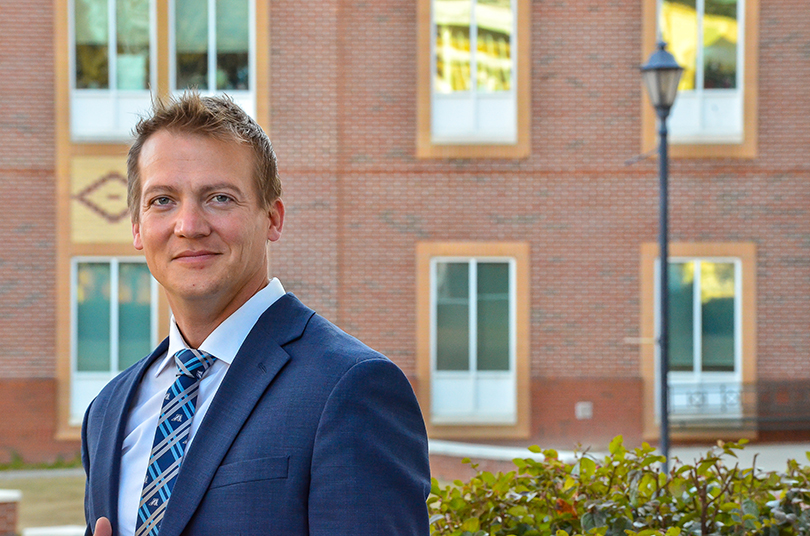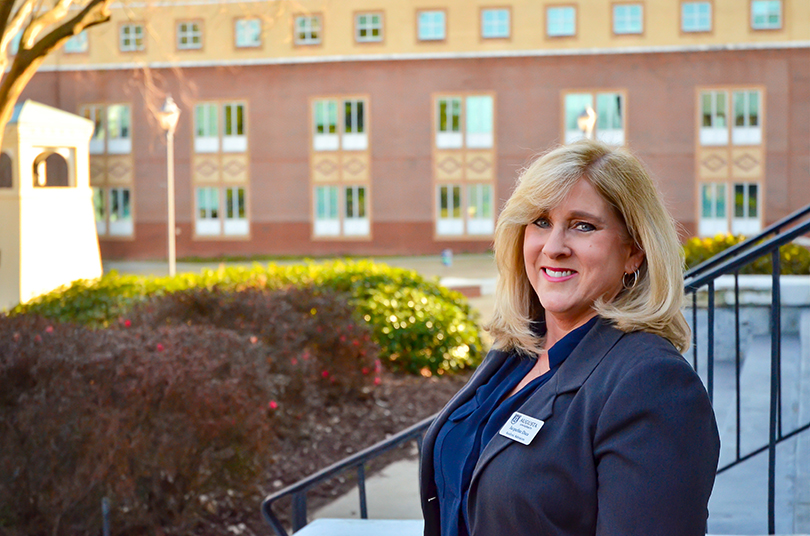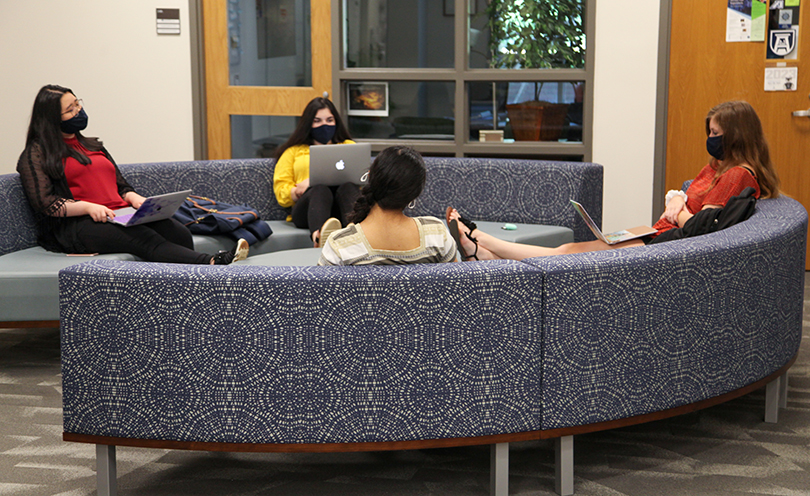When the COVID-19 pandemic forced Augusta University, along with all the other schools in the University System of Georgia, to temporarily shut down and restructure their education delivery and student support to become fully remote, Augusta University’s admissions team was at a critical phase of its admission cycle.
We had admitted most of our class, but now we had to yield the class,” says Jacqueline Duca, director of Academic Admissions. “Because the national deposit deadline for undergraduates is May 1, all of our admitted student programs usually happen in February, March and April.”
It’s during these months when the accepted become the committed, when the hard work of connecting high school seniors to the idea of being a Jaguar yields to the hard work of getting them to actually become Jaguars. And a lot of that is done by exposing them to the campus and to the students, faculty, staff and programs that exist there.
Except there was no campus to show them, no students or faculty or staff to talk to. At least not in person.
“We had to cancel all our plans for those face-to-face events and turn them around into virtual events,” Duca says. “We had to take this face-to-face relationship with our students and make it virtual … at a time when everybody else was doing the same thing. So how do you stand out amongst your competitors? What can you do to be different?”
Those were some tough questions to answer, and they didn’t just answer them; they answered them well: In the midst of a global pandemic when almost everything was an unknown, Augusta University’s enrollment increased by 3.1 percent.

In the best of times, recruiting students is an art as well as a science, and as the world enters the second year of pandemic-related social distancing constraints, both art and science are adapting to this new terrain.
“Much of what we do in enrollment management is to help align the strengths of the institution with the market,” says Dr. Alexis Pope, associate vice president for Enrollment Management. “We know that students have a lot of options on which institution they attend, so we try to get the student all the information in the most digestible way possible to help them make the right decision for them.”
A lot of that work is done through admissions counselors, who disseminate that information to those prospective students looking for a college home; but in order for them to effectively do that very difficult and labor-intensive job, they need resources. In short, they need information.
Starting at the highest level, that involves knowing just who those students are. So the university acquires about 125,000 names of traditional incoming freshmen for each academic year. This year, only about 40,000 of those wound up as inquiries, meaning they’ve specifically inquired about going to Augusta University. A percentage of those become applicants by actually applying to the university, and a percentage of those become admitted. And a percentage of those — 34.9 percent last year — will actually attend.
“We’re helping students at the top level figure out if we’re a good fit for them, and then we want them to get involved as much as we can,” Pope says. “Starting with the inquiry phase, we’re dealing with students one on one, because we don’t want to treat a student who fills out an inquiry form on our website the same way as a student whose name we’ve simply bought and we don’t know how interested they are. So as students invest in us, we’re always trying to invest appropriately back in them.”
That investment comes in the form of time and knowledge, and that knowledge is implemented by a constituent relationship management system (CRM) that holds collected information about a student so that counselors can make informed decisions based on what they know about them. And they know a lot.
If, say, you have a student from a lower income area who has applied for admission and you discover the student hasn’t looked at the university’s financial aid page, you can reinforce the affordability message — that Augusta University is an affordable state institution. Or, if the student lives in South Carolina, that tuition waivers are available. Or if the student is not in South Carolina but is in the top of their class, that they’re eligible for the presidential scholarship program.
“We know all about these students, and we’re hitting them left and right with appropriate communications,” Pope says.
Obviously, the pandemic changed how some of that is done. While a campus visit (once they were reinstated) could still help gauge interest, the meaning behind the lack of a campus visit wasn’t nearly as easy to interpret.
“With the pandemic, you’ve got so many other factors to consider in trying to figure out how engaged a student is, because they’re kind of secret shopping in a lot of areas you traditionally haven’t looked at,” Pope says.
But thanks to the CRM, they’re able to empower admissions counselors with the data they need to make the adjustments they need to make.
“We’re really giving them the ability to drill into these data sets so when they go to a high school, they click a button and they’ve got a full readout of every student — if they’re in the prospect, inquiry, applicant or admit phase — and the information about that student,” Pope says. “So when they can’t sit in a lunchroom or a college fair and have the students come to them, they can sit down with a counselor and say, ‘How’s Bobby doing? I know he applied — how’s he doing?’
“It’s taken a lot more energy to get that out to our recruitment staff, and a lot more energy for admissions counselors to make it happen.”
For Duca, the personal connections are very important.
“We focus on the emotional connections — the strong sense of the campus community, relationships with faculty and staff, and our current students’ stories,” she says. “We try to get current students interacting with prospective students. That’s who they want to talk to.”
One of the primary ways this connection is made is through campus tours. These tours are given by the 1828 Ambassadors — Augusta University students from all majors and backgrounds who talk with families and provide a personal perspective of what it’s like to be a student at Augusta University.
“[Because of COVID restrictions], we did not offer tours last summer,” says Emily Wilcox, a junior in her second year as an 1828 Ambassador.
Instead of personal tours, prospective students could watch a video tour, but Wilcox says that while valuable, the video lacks the personal experience she and her fellow ambassadors can provide.
“You don’t want to sound like you’re reading a book while giving a tour; you want them to feel like they’re actually making a connection with you, and you want it to feel exciting, because who wants to go to a boring school?” she says. “So I try to share as many stories as I can.”
Telling them that the Wi-Fi reaches out to the amphitheater is one thing, for example, but if you tell them from personal experience that you can also take naps out there, it’s quite another. As is a truthful critique of amenities.
“I always tell them, ‘I will tell you the hard truth: If you want to ask how the food is, I will tell you what I like and what I don’t like,’” she says. “I try to make it where it’s a conversation rather than just me spitting facts. I love spitting out facts because I feel very comfortable when I do that, but that’s not the most important part of being a tour guide.”
Two of these tours are given daily — now, with smaller groups, masks and proper distancing — and while the restrictions sometimes present a challenge, Wilcox says the tours are worth the hassles.
Other in-person aspects of the process are gradually coming back, such as Admitted Student Days. Last year, staff had to quickly figure out how to make the yield events virtual.
Last April, Virtual Admitted Student Day had over 110 participants via WebEx, and a social media push has made discussions about colleges, majors and housing easier for prospective students and their parents to access.
But like most people, students are also experiencing virtual burnout, so Duca and her team know they have to make any virtual events count.
“We have to make every visit/event very personal and provide students with the information they are seeking,” she says. “Our events are high-energy and we depend on motivated staff and faculty to convey their passion of AU.”
Typically, college fairs are a good way to generate interest in campus, but those have gone virtual, too, and although the university attends all the virtual national and regional fairs it can, that still leaves a gap that they’ve worked hard to fill.
“The Admissions team is reaching out to students in different ways — by email, printed mailings and on social media,” Duca says. “We’re trying to get information out to students through our website, virtual events and digital marketing campaigns.”
They are using data and predictive modeling to determine the likelihood of a student attending — through every stage of the admissions funnel, perspective students through enrolled students. They ‘re reaching out to parents directly and communicating with students who express a specific interest in academic majors or areas of interest.
And while they’ve learned some lessons along the virtual way — like big virtual events aren’t the best way to engage students — they’ve also learned that getting prospective students talking with current students and faculty is vital to the recruitment process.
“More than half of our student ambassadors say that the reason they chose Augusta is due to the faculty,” Duca says. “‘They care about me, they know me, they take time to talk to me.’ And some of them know if they were in a much larger institution, they wouldn’t get that face-to-face faculty interaction.”
And who can communicate that message better than the students who know it and the faculty who do it?

Although all this work is geared toward impacting enrollment numbers — something that’s even more important given the 16×30 initiative that’s working to increase enrollment to 16,000 students by 2030 — the individual attention given to the individual student has a secondary impact that might be even more important: It’s enabling the institution to take better care of the students once they’re Jaguars, which has a positive effect on their success.
If, for example, an advisement counselor knows that a pre-nursing student is having second thoughts or is struggling, the counselor can look at that student’s information and discover that the student had also expressed interest in other majors. Maybe there’s a theme. And maybe that theme can help the advisement counselor better understand the student and help find a new path that keeps the student excited, engaged and moving forward toward the completion of a degree and the beginning of a career.
“That level of data and our ability to selectively disseminate access to that data to people who are talking to the student about their career plans certainly not only helps getting students here to Augusta, but helps getting students graduated out of Augusta, too,” Pope says.
He says it reminds him of a tweet he read shortly after the Mars rover successfully landed on the red planet. Paraphrased, it said “I barely made it out of my first semester of engineering school with a 2.4 and now I’m building a Mars rover.”
“That’s the exciting part of the work,” Pope says. “It’s not just about taking students who are ‘I want to be a doctor’ and making it happen; it’s taking students who are ‘I don’t know if I can cut it in college’ to students who are building the Mars rover.”

© Copyright Augusta University. All Rights Reserved.

For nearly 200 years, Augusta University and its legacy institutions have been centers of learning and drivers of discovery and innovation in Augusta, the state of Georgia and beyond. Our community of alumni, students, faculty and friends are amazing people living incredible lives and making invaluable contributions to our world.
We are pleased to publish four magazines in which we get to tell their stories: